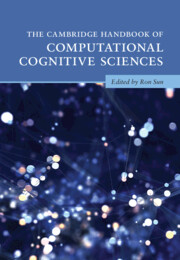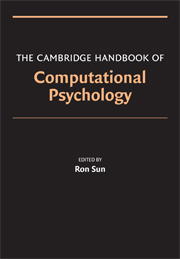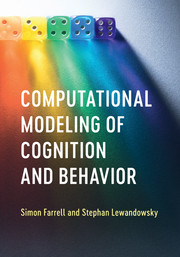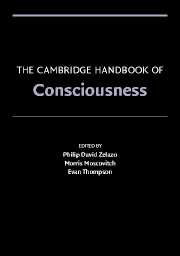
The Cambridge Handbook of Computational Cognitive Sciences
2nd Edition
£275.00
Part of Cambridge Handbooks in Psychology
- Editor: Ron Sun, Rensselaer Polytechnic Institute, New York
- Date Published: May 2023
- availability: In stock
- format: Multiple copy pack
- isbn: 9781108485074
£
275.00
Multiple copy pack
Other available formats:
Looking for an inspection copy?
This title is not currently available on inspection.
-
The Cambridge Handbook of Computational Cognitive Sciences is a comprehensive reference for this rapidly developing and highly interdisciplinary field. Written with both newcomers and experts in mind, it provides an accessible introduction of paradigms, methodologies, approaches, and models, with ample detail and illustrated by examples. It should appeal to researchers and students working within the computational cognitive sciences, as well as those working in adjacent fields including philosophy, psychology, linguistics, anthropology, education, neuroscience, artificial intelligence, computer science, and more.
Read more- Provides an accessible introduction to the field of computational cognitive sciences
- Combines breadth of coverage of the field with in-depth elucidation by leading scientists, thus useful for experts and non-experts alike
- Appeals to researchers and advanced students in related fields including philosophy, psychology, linguistics, neuroscience, artificial intelligence, and more
Reviews & endorsements
'Ron Sun shines fresh light on the complex mechanisms underlying human cognition, marshaling expositions from a broad range of experts. Volume 1 shows the diversity of paradigms that can be employed, from neural networks to Bayesian methods to dynamic systems, and then shows how these can be applied to model the underlying mechanisms. While these chapters alone would be worth the price of admission, Volume 2 then offers a rich array of further payoffs in areas ranging from vision, motor control and emotion to creativity and, even, morality.' Michael Arbib, University of Southern California, USA
See more reviews'The Cambridge Handbook of Computational Cognitive Sciences is a great collection of useful chapters. Ron Sun has recruited a stellar set of authors. It will be an excellent resource for cognitive modeling and psychology. It belongs on every modeller's bookshelf and in their library. This book will be very helpful in my and my students' work. I want to read all the chapters, and I will need to read and cite most of them.' Frank Ritter, Pennsylvania State University, USA
'Computational models have been central to cognitive science since the 1950s, making important contributions to the design and testing of theoretical explanations of mind. Through chapters by an army of leading experts, this Handbook provides a remarkably broad overview of computational modeling. Researchers and students in cognitive science will find it indispensable.' Paul Thagard, University of Waterloo, Canada
Customer reviews
Not yet reviewed
Be the first to review
Review was not posted due to profanity
×Product details
- Edition: 2nd Edition
- Date Published: May 2023
- format: Multiple copy pack
- isbn: 9781108485074
- length: 900 pages
- dimensions: 259 x 184 x 75 mm
- weight: 2.7kg
- availability: In stock
Table of Contents
Volume 1: Part I. Introduction:
1. An overview of computational cognitive sciences Ron Sun
Part II. Cognitive modeling paradigms:
2. Connectionist models of cognition Michael S. C. Thomas, James L. McClelland
3. Bayesian models of cognition Thomas L. Griffiths, Charles Kemp, Joshua B. Tenenbaum
4. Symbolic and hybrid models of cognition Tarek R. Besold, Kai-Uwe Kühnberger
5. Logic-Based modeling of cognition Selmer Bringsjord, Michael Giancola, Naveen Sundar Govindarajulu
6. Dynamical systems approaches to cognition Gregor Schöner
7. Quantum models of cognition Jerome R. Busemeyer, Emmanuel M. Pothos
8. Constraints in cognitive architectures Niels Taatgen, John Anderson
9. Deep learning Marco Gori, Frédéric Precioso, Edmondo Trentin
10. Reinforcement learning Kenji Doya
Part III. Computational modeling of basic cognitive functionalities:
11. Computational models of categorization Kenneth J. Kurtz
12. Computational cognitive neuroscience models of categorization F. Gregory Ashby, Yi-Wen Wang
13. Models of inductive reasoning Brett K. Hayes
14. Analogy and similarity John E. Hummel, Leonidas A. A. Doumas
15. Mental models and the algorithms of deduction Philip N. Johnson-Laird, Sangeet S. Khemlani
16. Computational models of decision making Joseph G. Johnson, Jerome R. Busemeyer
17. Computational models of skill acquisition Stellan Ohlsson
18. Computational models of episodic memory Per B. Sederberg, Kevin P. Darby
19. Computational neuroscientific models of working memory Thomas E. Hazy, Michael J. Frank, Randall C. O'Reilly
20. Neurocomputational models of cognitive control Debbie M. Yee, Todd S. Braver
21. Computational models of animal and human associative learning Evan J. Livesey
22. Computational and cognitive models of reinforcement learning Kenji Doya
Volume 2: Part IV. Computational modeling in various cognitive fields:
23. Computational models of developmental psychology Thomas R. Shultz, Ardavan S. Nobandegani
24. Computational models in personality and social psychology Stephen J. Read, Brian Monroe
25. Computational modeling in industrial-organizational psychology Jeffrey B. Vancouver
26. Computational modeling in psychiatry Cody J. Walters, Sophia Vinogradov, A. David Redish
27. Computational psycholinguistics Matthew W. Crocker, Harm Brouwer
28. Natural language understanding and generation Marjorie McShane, Sergei Nirenburg
29. Computational models of creativity Sébastien Hélie, Ana-Maria Olteteanu
30. Computational models of emotion and cognition-emotion interaction Eva Hudlicka
31. Computational approaches to morality Paul Bello, Bertram F. Malle
32. Cognitive modeling in social simulation Ron Sun
33. Cognitive modeling for cognitive engineering Matthew L. Bolton, Wayne D. Gray
34. Modeling vision Lukas Vogelsang, Pawan Sinha
35. Models of multi-level motor control Martin Giese, David Ungarish, Tamar Flash
Part V. General discussion:
36. Model validation, comparison and selection Leslie M. Blaha, Kevin A. Gluck
37. Philosophical issues in computational cognitive sciences Mark Sprevak
38. An evaluation of computational modeling in cognitive sciences Margaret A. Boden.
Sorry, this resource is locked
Please register or sign in to request access. If you are having problems accessing these resources please email [email protected]
Register Sign in» Proceed
You are now leaving the Cambridge University Press website. Your eBook purchase and download will be completed by our partner www.ebooks.com. Please see the permission section of the www.ebooks.com catalogue page for details of the print & copy limits on our eBooks.
Continue ×Are you sure you want to delete your account?
This cannot be undone.
Thank you for your feedback which will help us improve our service.
If you requested a response, we will make sure to get back to you shortly.
×



